Quintana Roo Honors its Wetsuit Roots
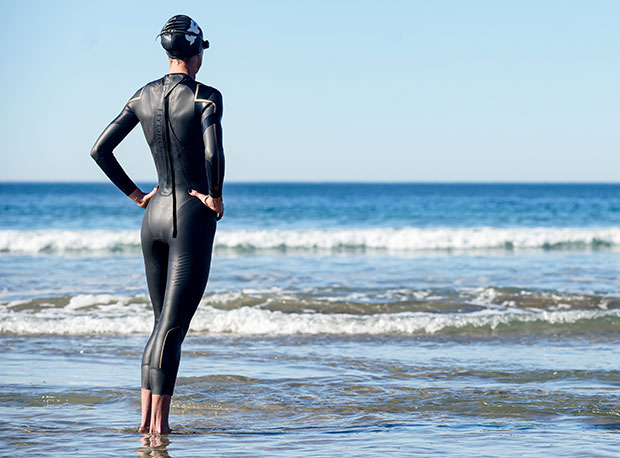
Quintana Roo might be best known for its bikes but this brand – celebrating its 35th year – began as a wetsuit maker. For sure wetsuits didn’t get much of a head start; QR as a bike brand is only one year younger. Also, QR’s wetsuits owned a market share in the U.S. that I don’t think has ever been matched by any brand in wetsuits or bikes. According to my memory in one magazine’s (early 1990s) poll 65 percent of triathlon wetsuits sold in the U.S. was made by this brand. There were reasons for this and as Quintana Roo launches new wetsuits for 2022 it appears to me this company has remembered them.
Remember, this brand launched the category. Prior to Quintana Roo any wetsuit sold to a triathlete was pretty much a surfing wetsuit. The idea was a wetsuit to keep you warm. The Quintana Roo wetsuits launched in 1987 were the first to be not just warm, but fast and optimized for surface swimming.
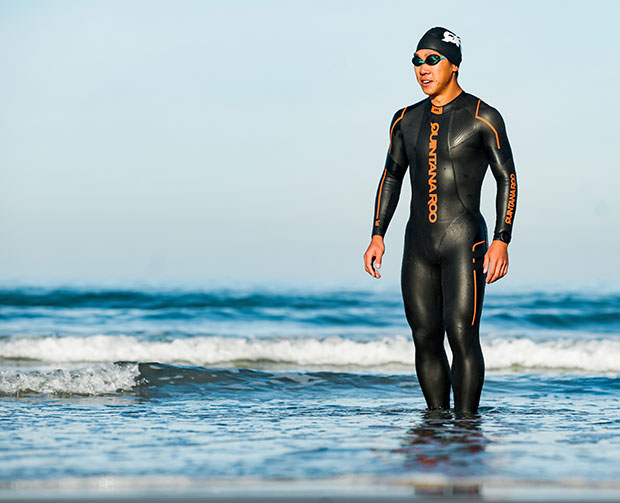
This brand is not simply living off its legacy. The new wetsuits launched today – and the policies, the thesis behind pricing, sales channels – parallel the practices that helped fuel QR’s growth in the late 80s. Here’s an example. You have 14 days to test this wetsuit, taste it, sniff it, swim in it, and if you don’t like it send it back for a full refund. The company got a lot of heat for this back in the 1980s because your LBS who sells this wetsuit was certain you’d all buy the wetsuit, race in it, and then return it for a refund. (Almost no one actually did that).
Here’s another example. You have a 2-year no-fault warranty with this wetsuit. Thirty-plus years ago ads by this company ran that said, “The dog eats it, the car runs over it, your spouse throws dries it in the high heat cycle, we’ll repair or replace it no charge.” The high heat cycle thing actually happened. That athlete got his replacement wetsuit from QR, no charge, before he knew that his original QR wetsuit came out of the dryer looking like a ball of plastic.
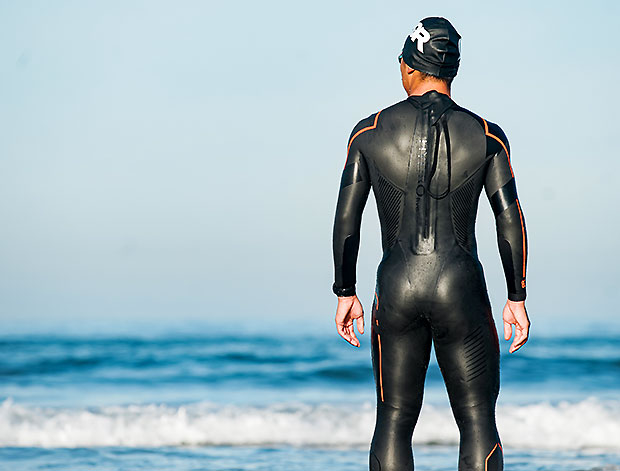
Wetsuits back then were sold through your LBS, or your tech running store, or direct from the manufacturer. These days you get your QR mostly via that latter sales channel. Let’s talk pricing for a moment, and then we’ll get into the nuts and bolts of these new wetsuits. These fullsuits launched today, the HYDROsix2 and the HYDROfive2, sell for $595 and $479 respectively. Why those prices? By my reckoning that's the least a company can charge for wetsuits like this while maintaining profitability. Why do I know this? I set the prices for my wetsuits back in the 1980s and that was my rationale. Back then, a QR fullsuit sold for $220 and today, inflation adjusted, that price would be $545 (and that was before I changed to more expensive Yamamoto SCS #39, which we’ll get to in a minute).
I have a pretty good idea what goes into making a triathlon wetsuit, and I have never understood how a triathlon wetsuit can cost north of $1000. There are patterns but no molds, unless you count the hardware to stamp a pattern into the rubber. But even then I question the utility of that. Vintage QR wetsuits never had pulling panels or stamped channels because the wetsuits were – argh! perish the thought! – tested, and if it didn’t add speed the “feature” was rejected. So what you’re left with is the cost of rubber, a $2 zipper, glue, thread, seam tape, silkscreening and the labor and sewing machines to put it together. My point is: these QR wetsuits are sold for a fair price and I wish I could say that of all the triathlon wetsuit makers today.
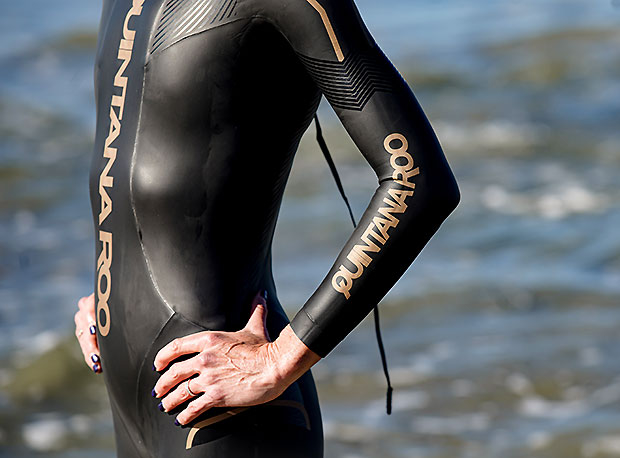
I have a HYDROsix2 and not only does the company and its policies parallel those of 35 years ago, the wetsuit itself is pretty similar in a number of ways. The name comes from the early 1990s, when QR introduced the Hydrofull. The etymology goes like this: Tommy Yamamoto would make trips over to the U.S. to try to get surf wetsuit companies to buy the rubber he made in his Osaka, Japan factory. I happened to meet Tommy at a surf wetsuit factory I was visiting, and while Tommy extolled the virtues of his jersey (the fabric adhered to the rubber) I was taken by the softness of the rubber he made. I got his business card and contacted him later, and began making wetsuits out of his rubber. But that rubber was prone to fingernail tears. Tommy came up with a solution, literally a “solution” painted onto the rubber that he called SCS; Super Composite Skin. That coating not only gave the rubber an armor against fingernail tears, it repelled water. Hydrophobic means “tending to repel water.”
The HYDROsix2 still has that signature Yamamoto rubber, and the #39 SCS rubber you see in that suit is exactly what we used 30 years ago. These suits are made with Yamamoto #39 and #40 rubber, which has not changed over the past 30 years and it hasn’t needed to. The suit is expertly crafted, the seams are artful, and it is not easy to glue 5mm rubber panels directly to 2mm panels, which is what you need to do when you move from a float panel to a stretch panel (you’ll want thinner rubber in the shoulders and arms). The neck is soundly made, fits well, doesn’t choke me nor serve as a water scoop. There is seam tape at critical junctions.
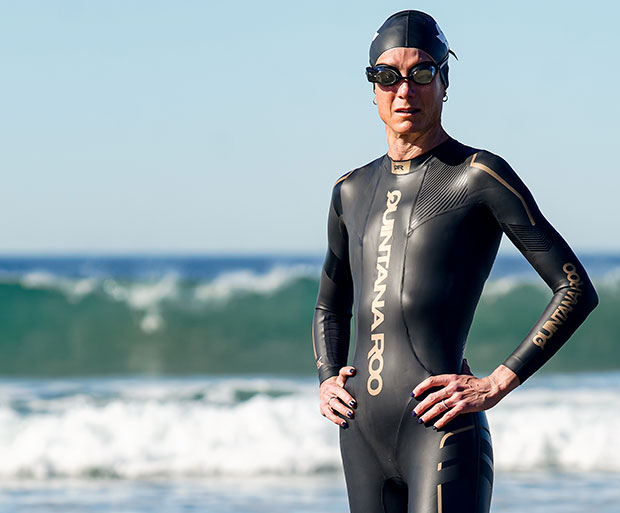
So far, so good, yes? Let’s get to the aspects of the HYDROsix2 that differ from the Quintana Roo of old, or where I don’t stipulate to the decisions or statements Quintana Roo has made. And, look, I’m going to get very picky here.
Fit
The first and most obvious thing that’s different – not just from historic QR but from pretty much all other brands – is that the sizing is now unisex. This is not a cost-saving measure. There are still 14 sizes, and back in “my day” this was the case. Just, back then, 30 years ago, there were 10 mens and 4 womens sizes. Mens XS and womens M were, back then, pretty similar. If you were 5’7” tall and 130 pounds you were in 1 of those 2 sizes and you’d be right if you said, “But wait! Women are smaller in the chest and larger in the hips!” Yes. Kind of. But I can tell you that, according to my memory, one IRONMAN World Champion male fit better in a women’s size than in a men’s size and swam in that womens-size wetsuit; and one IRONMAN World Champion female swam better in a mens than a womens size and swam in that mens-size wetsuit.
I’m not writing in favor of unisex sizing. I’m just offering data points. I’m unsure. I’d need all 14 sizes and a couple of hundred people to answer that question of whether I’m completely comfortable with unisex sizing. QR either does have or will soon have that data and we’ll all know. What I do like about these sizes is that they’re different than what’s out there. They’re accretive to the sizing already in the marketplace. We now have another fit paradigm. I fit okay in the size I have. All the circumferences are good. It fits right all in the right places, with this exception: the suit is a little short for me in the torso (by about a half-inch), and the legs and arms are an inch short.
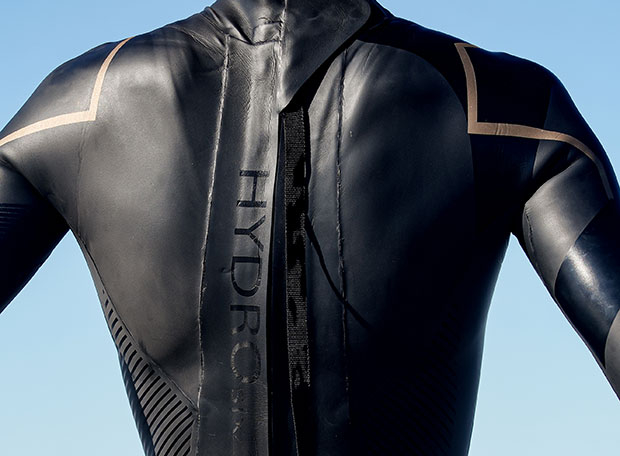
This just means that the LG size fits somebody perfectly, and that person is me at 5’11” or 6’0” rather than the actual 6’2” me. But the suit “fits” me per the size chart. In the old days of QR, we were constantly working on patterns; constantly tweaking patterns, making new patterns, finding customers who our wetsuits didn’t fit and if we felt this was a representative customer we’d make a new pattern. I predict QR is in the beginning now of that process with this new fit paradigm. Look at the images here of a man and a woman. If you look at how the wetsuit fits in the sleeve area, it’s full-length on the man. The sleeves could be an inch longer in the very leggy woman (I know she’s leggy, rather than “torsoey”, because I’ve fit her to her bike). How to make your patterns fit all these people is the curse of the wetsuit maker.
QR says that, “When picking your size, we recommend to go on the ‘smaller’ end to increase your performance fit.” We’ll see about that. It’s their product, their company, they live with the customer service element every day. Just, I’m pretty similar in height and weight now to what I was 30 years ago, and 30 years ago if there was any question about size I erred on buying the smaller size. Today I err on buying the larger size. If QR is basing its view on how their pros and product testers fit in their wetsuits, okay, but if those product testers are hard-charging AGers who all have bodies like underwear models, that cohort does not represent me. Because today’s QR has such a tight relationship with its consumers, and has that same attention to customer service and detail that this brand had since the company’s beginning, it will become apparent pretty quickly whether this company has size-prescribing down to a science or whether there will be a bit of return-for-wrong-size as this new sizing scheme plays out. (Worst case, if the wetsuit doesn’t fit you have oodles of time to send it in for another size.)
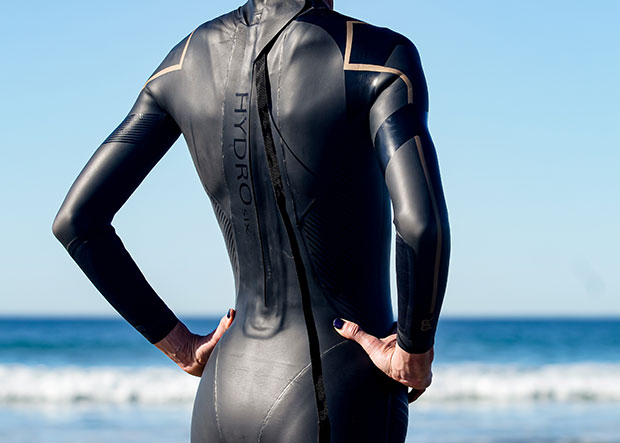
Sub-assemblies
If you make a unisex sizing the top of the suit is going to be a little slimmer. That’s what I would expect and that’s what I found with the HYDROsix2 and the HYDROfive2. I had no problem with this. Per se. But in my own wetsuit making days one of the pattern enigmas was the space in the low back, below the zipper, trying to get that part of the suit to sit snug against the low back. When you solved that problem – and we did – there is a new problem created, which is, the suit is now narrow enough in the waist that folks with wide hips find the suit a little harder to pop over the hips. (Look at the pic above; this is a new QR fullsuit and this is the way it’s supposed to fit in the low back.) But solving this pattern issue caused us to start putting longer zippers in our suits. Rather than the typical 18” zippers we put 20” and sometimes 22” zippers depending on size. I could have used a zipper 2” longer in the LG size in the HYDROsix, and if this was my wetsuit I’d add 3” or 4” to the length of the pull cord.
Features
The neck is the part of the wetsuit that more brands struggle with than any other. This suit’s neck is fine and better than most. The other “feature” that’s in just about everybody’s wetsuit but needs to be in just about nobody’s wetsuit is the pulling panel. Why is that panel there? Because wetsuit makers are afraid to exclude it – they don’t want to be out-featured. Of course I can’t test this panel for “speed” because I have no HYDROsix2 without the panel. But I can hazard a guess: This wetsuit would have been fine if no panel was placed in the arm.
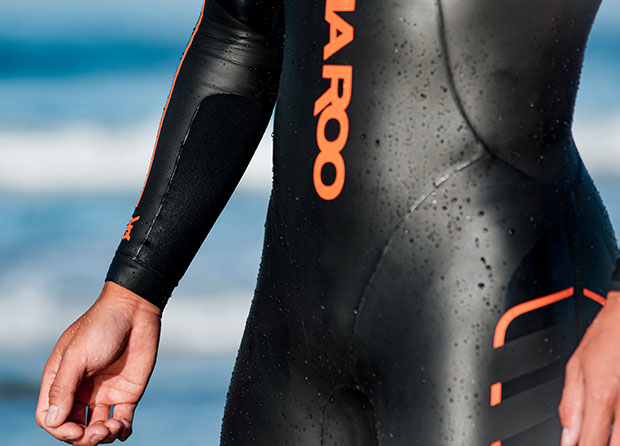
Performance
This is the easy part for me to write, and the shortest. The wetsuit performs just fine. It’s very close to as fast as 90 percent of the other wetsuits out there you may want to buy. What about the other 10 percent? This list of your “fastest” wetsuits depends on your swim abilities and your body dimensions. A QR HYDROsix2 may be as fast for you as any wetsuit made today. There is no obvious reason why it wouldn’t be. It’s got all the requisite elements.
Understand what these wetsuits are. A QR HYDROsix2 uses in my opinion the fastest rubber made, which is also the rubber likely to cause a wetsuit to fit and be comfortable. It’s made with the best construction, in a premier factory. This brand makes no outlandish claims about its wetsuit; and charges no outlandish price. It’s a well made product out of world leading materials in a competent factory, supported by a customer service team that is as good as they come. In other words, the imperatives and the execution that defined this brand 35 years ago remain in place today.
You can take a closer look at here at the HYDROsix2 and the HYDROfive2.



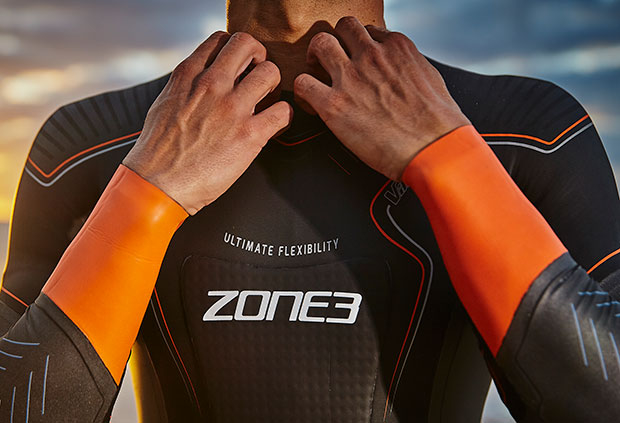
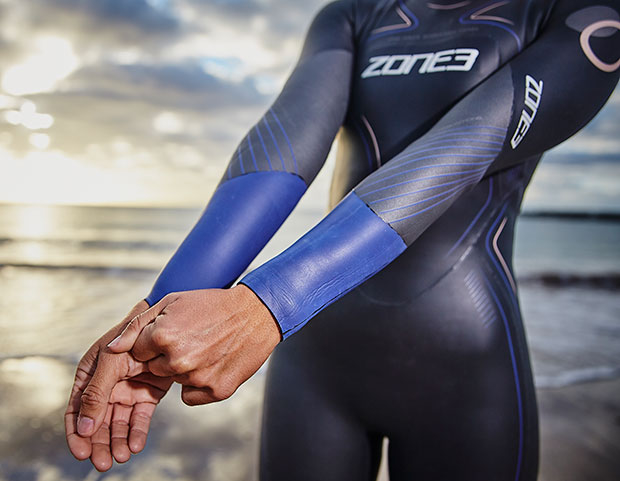
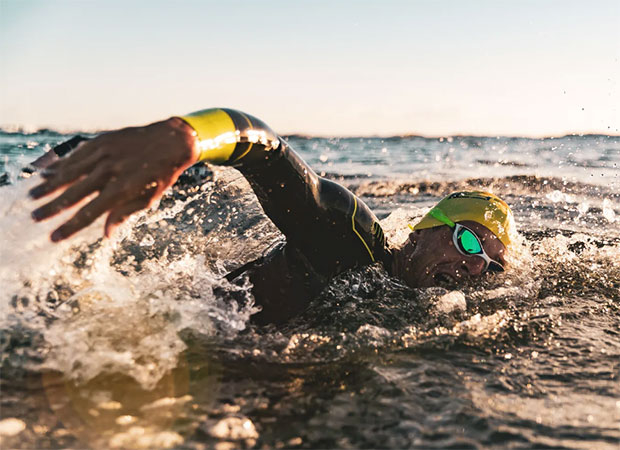

Start the discussion at forum.slowtwitch.com